So How to Protect Your Skin’s Natural Barrier?
This guide will help you understand how to maintain and strengthen your skin’s natural barrier, which is imperative for overall skin health. The skin barrier acts as a protective shield against environmental stressors, moisture loss, and harmful bacteria. For effective product recommendations, explore 7 Best Products for Skin Barrier Protection.
By following simple yet effective practices, you can prevent damage and promote a radiant complexion. Learn more about essential skincare practices in 5 Tips to Maintain a Healthy Skin Barrier.
Discover the best methods to enhance your skin barrier’s resilience and ensure a healthier, more vibrant you. For additional insights, visit Top 7 Ways to Strengthen Your Skin Barrier Naturally.
Table of Contents
Key Takeaways:
- Hydration: Ensure your skin is well-hydrated by using moisturizers that contain ingredients like hyaluronic acid and ceramides.
- Gentle Cleansing: Opt for gentle, non-stripping cleansers to maintain the integrity of your skin’s barrier.
- Sun Protection: Apply a broad-spectrum sunscreen daily to prevent UV damage, which can compromise your skin’s barrier.
- Avoid Harsh Ingredients: Steer clear of products with alcohol, fragrances, or strong acids that can irritate and weaken your skin barrier.
- Balanced Diet: Incorporate foods rich in antioxidants and omega fatty acids to support skin health from the inside out.
Understanding Your Skin’s Natural Barrier
A proper understanding of your skin’s natural barrier is necessary for maintaining optimal skin health. The skin barrier, also known as the stratum corneum, serves as the body’s primary defense mechanism against environmental stressors, pathogens, and loss of moisture. It is composed of layers of skin cells and lipids that work together to create a protective shield. For tips on fortifying your barrier, explore 7 Best Ways to Strengthen Your Skin Barrier.
What is the Skin Barrier?
What constitutes the skin barrier is an important aspect to grasp. The skin barrier acts as a barrier that regulates hydration levels, protects against external irritants, and promotes overall skin health. Essentially, it is the outermost layer of your skin that contains intercellular lipids that help retain moisture. If this barrier becomes compromised due to environmental factors or harsh products, it may lead to dry, sensitive, or irritated skin. Learn more in 5 Signs of a Damaged Skin Barrier and How to Repair It.
TTypes of Skin Barriers
The different types of skin barriers can impact how your skin responds to external stimuli. There are necessaryly two types of skin barriers: the physical barrier and the chemical barrier. The physical barrier consists of the tightly packed skin cells and lipids, while the chemical barrier involves naturally occurring substances on the skin’s surface, such as fatty acids and antimicrobial peptides. When you recognize these distinctions, you can better tailor your skincare routine to fortify your skin. For product suggestions, explore 7 Best Products to Strengthen Your Skin’s Physical and Chemical Barriers.
| Type of Skin Barrier | Description |
|---|---|
| Physical Barrier | Composed of skin cells and lipids, protects against external threats. |
| Chemical Barrier | Includes natural proteins and substances that combat pathogens. |
| Hydration Levels | Affects the skin’s comfort, texture, and resilience. |
| Irritation Potential | Compromised barriers lead to increased irritation and sensitivity. |
| Repair Mechanisms | Natural processes that help restore barrier function. |
Skin barriers are not just about protection; they also play a significant role in overall skin function. When your skin barrier is healthy, it efficiently manages moisture retention and acts as a shield against external pollutants. Conversely, if the barrier is compromised, it can lead to various skin issues, including dryness, redness, and susceptibility to infections. Learn more in 5 Signs of a Compromised Skin Barrier and How to Repair It.
- Physical Barrier: Key to safeguarding against environmental factors.
- Chemical Barrier: Vital for combating pathogens and maintaining health.
- Hydration: Essential for a supple and youthful appearance.
- Integrity: Compromised barriers result in increased sensitivity.
- Restoration: Utilization of correct practices for barrier support.
After understanding the types of skin barriers and their functions, you can adopt practices to ensure they remain strong and resilient. For maintenance tips, check out Top 5 Practices to Strengthen Your Skin Barrier.
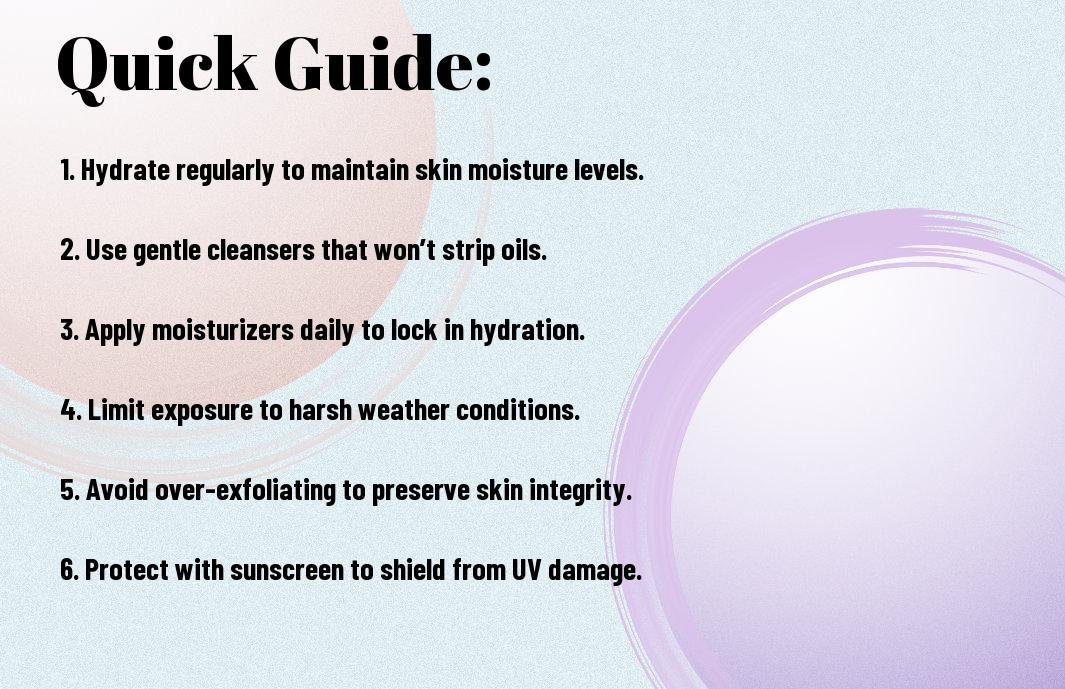
Factors Affecting the Skin Barrier
Some of the key factors that can impact your skin barrier are environmental conditions, lifestyle choices, and even underlying health issues. Each of these elements can challenge the integrity of your skin’s protective layer, leading to dryness, irritation, and other skin concerns. It’s crucial to recognize how these factors interplay and take proactive measures to maintain a healthy barrier. Learn more in 7 Key Factors That Impact Your Skin Barrier.
Environmental Factors
Factors such as air pollution, temperature fluctuations, and solar radiation play significant roles in compromising your skin barrier. Your skin is constantly exposed to external elements that can strip away its natural oils and moisture. For instance, exposure to UV rays can lead to premature aging and increase the vulnerability of your skin. Additionally, living in urban environments often means facing higher levels of pollution, which can exacerbate skin conditions like eczema and acne. For protective skincare options, explore 5 Best Products to Shield Your Skin from Environmental Damage.
- Air pollution
- UV radiation
- Climate changes
- Humidity levels
- Wind exposure
- Indoor heating
- Cleansing products
Assume that by recognizing these environmental impacts, you can choose suitable protective products and routines to support your skin barrier. For tips, visit Top 5 Skincare Practices for Urban Environments.
Lifestyle Choices
While nourishing your skin involves an understanding of external factors, your lifestyle choices also significantly contribute to your skin barrier health. Daily habits such as your diet, hydration level, and skincare routine can either support or undermine the strength of your skin barrier. For example, consuming a diet rich in antioxidants and crucial fatty acids can bolster your skin’s resilience, while a lack of hydration can lead to dryness and increased permeability of the skin.
This is especially true if you engage in habits like smoking or excess alcohol consumption, which can lead to inflammation and oxidative stress on your skin. Prioritizing restful sleep and managing stress through mindfulness or physical activities can also play a strong role in keeping your skin vibrant and healthy. For guidance, check out 7 Lifestyle Changes for Healthier Skin Barriers.
Tips for Protecting Your Skin Barrier
Many people overlook the importance of protecting their skin’s natural barrier, which plays a critical role in maintaining overall skin health. Here are some imperative tips to help you achieve this goal:
- Choose gentle, non-irritating cleansers.
- Incorporate moisturizers that contain ceramides and fatty acids.
- Avoid over-exfoliating as it can lead to barrier damage.
- Protect your skin from harsh environmental factors using SPF.
- Be mindful of the temperature, as extreme heat and cold can affect your skin.
The health of your skin barrier is fundamental in preventing issues such as dryness and inflammation. For more detailed insights and recommendations, check out Skin Barrier Basics: How To Achieve Optimal ….
Daily Skincare Routine
Tips for optimizing your daily skincare routine include using products suited for your skin type. Prioritize a gentle cleansing method to remove dirt and excess oil without stripping your skin’s natural moisture. After cleansing, applying a high-quality moisturizer will help to lock in hydration and support your skin barrier. Look for products with ingredients like hyaluronic acid, which draw moisture into the skin, and niacinamide, which can enhance the function of the barrier. For product recommendations, explore 5 Best Moisturizers for Supporting Skin Barrier Health.
Nutrition and Hydration
Assuming you understand the relationship between what you consume and your skin health, incorporating a balanced diet rich in vitamins and antioxidants can support your skin’s barrier function. Focus on foods that contain omega-3 fatty acids, such as fatty fish, flaxseeds, and walnuts, which can help maintain the skin’s lipid barrier. Additionally, staying adequately hydrated by drinking plenty of water can aid in overall skin moisture, promoting a brighter and more resilient appearance. For more tips, read Top 7 Foods to Boost Skin Hydration and Barrier Function.
Another important aspect of maintaining your skin’s health is incorporating nutrient-dense foods like fruits and vegetables that are high in vitamins A, C, and E. These vitamins play significant roles in skin repair and regeneration. When your body is well-nourished and hydrated, it can efficiently support your skin’s natural barrier, helping to prevent irritation and dryness. For dietary insights, visit 5 Vitamins for Healthier Skin and Stronger Barriers.
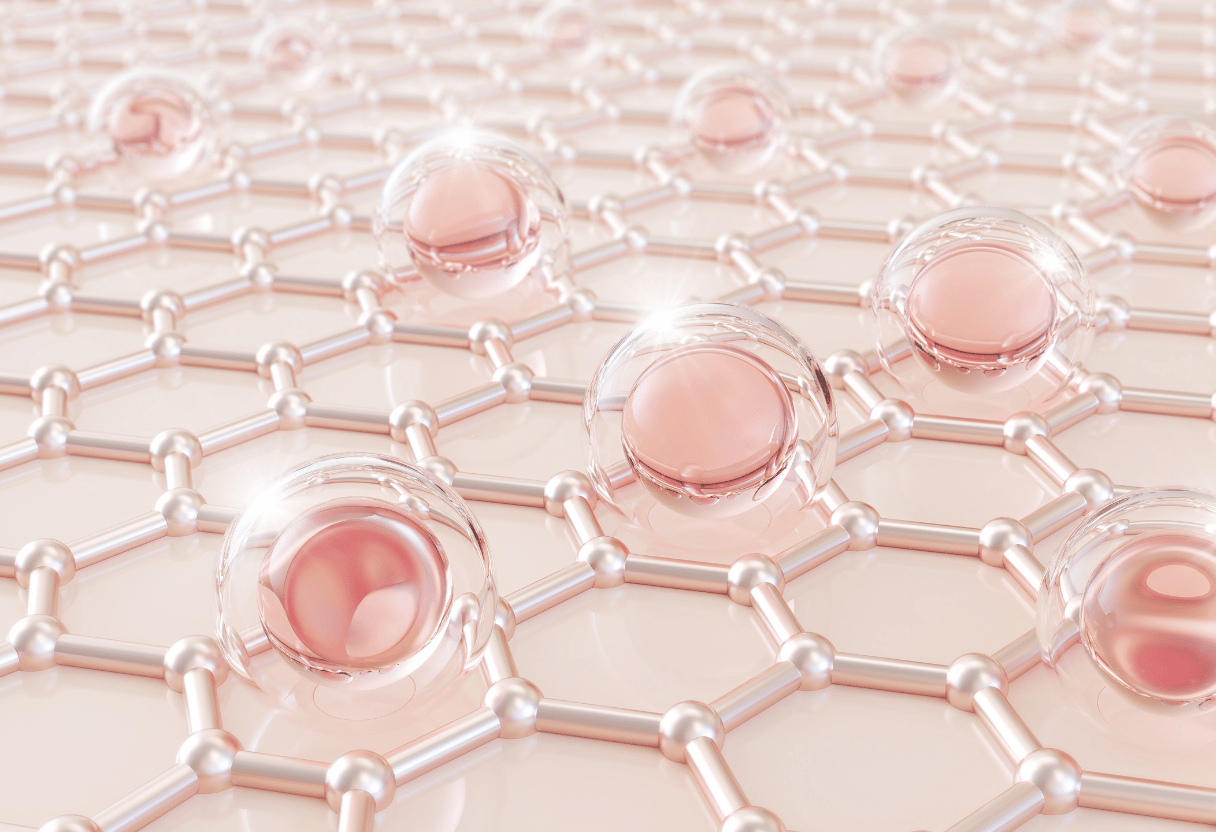
Step-by-Step Guide to Strengthening Your Skin Barrier
Despite the outer layer of your skin being your body’s first line of defense, it can easily become compromised due to various factors such as environmental stressors, harsh skincare products, and lifestyle choices. In order to help restore and strengthen your skin’s natural barrier, implement the following effective steps. For product suggestions, check out Top 7 Products to Strengthen Your Skin Barrier.
| Step | Description |
|---|---|
| Cleansing Techniques | Use gentle, hydrating cleansers and avoid hot water to prevent stripping your skin of necessary oils. |
| Moisturizing Properly | Apply a suitable moisturizer that contains ceramides, hyaluronic acid, or other skin-repairing ingredients. |
| Sun Protection | Utilize broad-spectrum sunscreen with at least SPF 30 daily to protect your skin from UV damage. |
| Healthy Diet | Incorporate foods rich in antioxidants, omega-3 fatty acids, and vitamins to support skin health from the inside out. |
Cleansing Techniques
Clearly, cleansing is foundational to maintaining your skin’s barrier function. When you wash your face, opt for a gentle, hydrating cleanser that won’t rob your skin of its natural oils. Avoid using hot water, as it can exacerbate dryness and irritation. Instead, use lukewarm water, which is less likely to disrupt your skin’s protective layer while effectively removing impurities. For more insights, read 5 Best Cleansing Practices to Maintain Skin Barrier Health.
Additionally, limit your cleansing routine to twice daily—morning and night. Over-cleansing can lead to an imbalance in your skin’s moisture levels. Always pat your skin dry with a soft towel, as rubbing can also damage the barrier. By adopting these cleansing techniques, you can significantly minimize water loss and maintain optimal hydration levels.
Moisturizing Properly
You should incorporate a quality moisturizer into your daily skincare regimen to support and enhance your skin barrier. A good moisturizer acts as a protective layer that locks in moisture and prevents transepidermal water loss. Look for products that contain ceramides, squalane, or hyaluronic acid, as these ingredients are known to bolster the skin’s natural defenses.
For instance, after cleansing, apply your moisturizer while your skin is still slightly damp. This practice helps to trap moisture, leaving your skin feeling hydrated throughout the day. Always choose a formula that suits your skin type; lighter gels for oily skin, and thicker creams for dry skin. By paying close attention to how well you moisturize, you can greatly enhance your skin’s protective barrier. For product ideas, visit 7 Best Moisturizers for Skin Barrier Repair.
Pros and Cons of Different Skincare Products
All skincare products come with their own set of advantages and disadvantages. Understanding these pros and cons can help you make informed choices to protect your skin’s natural barrier. Below is a table detailing some common skincare products and their respective strengths and weaknesses. For a more detailed analysis, check out Top 7 Skincare Products for a Healthy Skin Barrier.
| Product Type | Pros | Cons |
|---|---|---|
| Natural Ingredients | Lower risk of irritation | Less potent for severe skin issues |
| Chemical Components | Highly effective for targeted treatments | Potential for irritation and sensitivity |
| Moisturizers | Hydrates and locks in moisture | Can lead to clogged pores if not chosen wisely |
| Sunscreens | Protects against UV damage | Can feel greasy or heavy on the skin |
| Cleansers | Removes dirt and impurities | Some may strip natural oils from the skin |
| Exfoliants | Promotes cell turnover | Can cause irritation if overused |
| Toners | Balances skin pH | May contain alcohol that dries the skin |
| Serums | Packs a concentrated dose of active ingredients | Can be expensive |
| Facial Oils | Provides additional hydration | Can aggravate oily skin types |
| Mask Treatments | Offers intensive treatment options | May require a lengthy application time |
Natural Ingredients vs. Chemical Components
Cons of natural ingredients can include less effectiveness in treating specific skin conditions. While they are generally gentler on your skin, they might not deliver the strong results needed for issues like acne or hyperpigmentation. This can lead you to seek stronger treatments that contain chemical components. On the other hand, while chemical components can offer a more immediate impact, they also carry a higher risk of inducing irritation or allergic reactions, making it necessary for you to patch-test any new product. Learn more in 5 Tips for Combining Natural and Chemical Skincare Products.
Incorporating both natural and chemical components into your skincare regimen can often provide a balanced approach. For instance, you can use gentle cleansers with natural ingredients in conjunction with targeted treatments that utilize the power of active chemical compounds. This combination can help you maintain your skin’s necessary moisture while still addressing specific concerns.
Over-the-Counter vs. Prescription Products
An important distinction between over-the-counter and prescription products is their formulation strength and purpose. Over-the-counter items generally provide milder solutions aimed at everyday skin maintenance. While these products can effectively address minor skin issues or serve as preventive measures, serious concerns may require the power of prescription products that contain higher concentrations of active ingredients. However, these stronger formulas often come with increased risks of side effects. For guidance, check out 7 Over-the-Counter Products vs. Prescription Solutions: What’s Right for You?.
Another aspect worth considering is the accessibility of these products. Over-the-counter products are readily available at drugstores and online, making them easy to incorporate into your skincare routine. In contrast, prescription products necessitate a consultation with a dermatologist, which may involve additional time and cost. However, if your skin conditions are severe or persistent, the benefits of prescription-strength products may greatly outweigh any inconvenience. Ultimately, your choice should be guided by your specific skin needs and consultation with a qualified skincare professional to ensure the best outcome for your skin’s health.
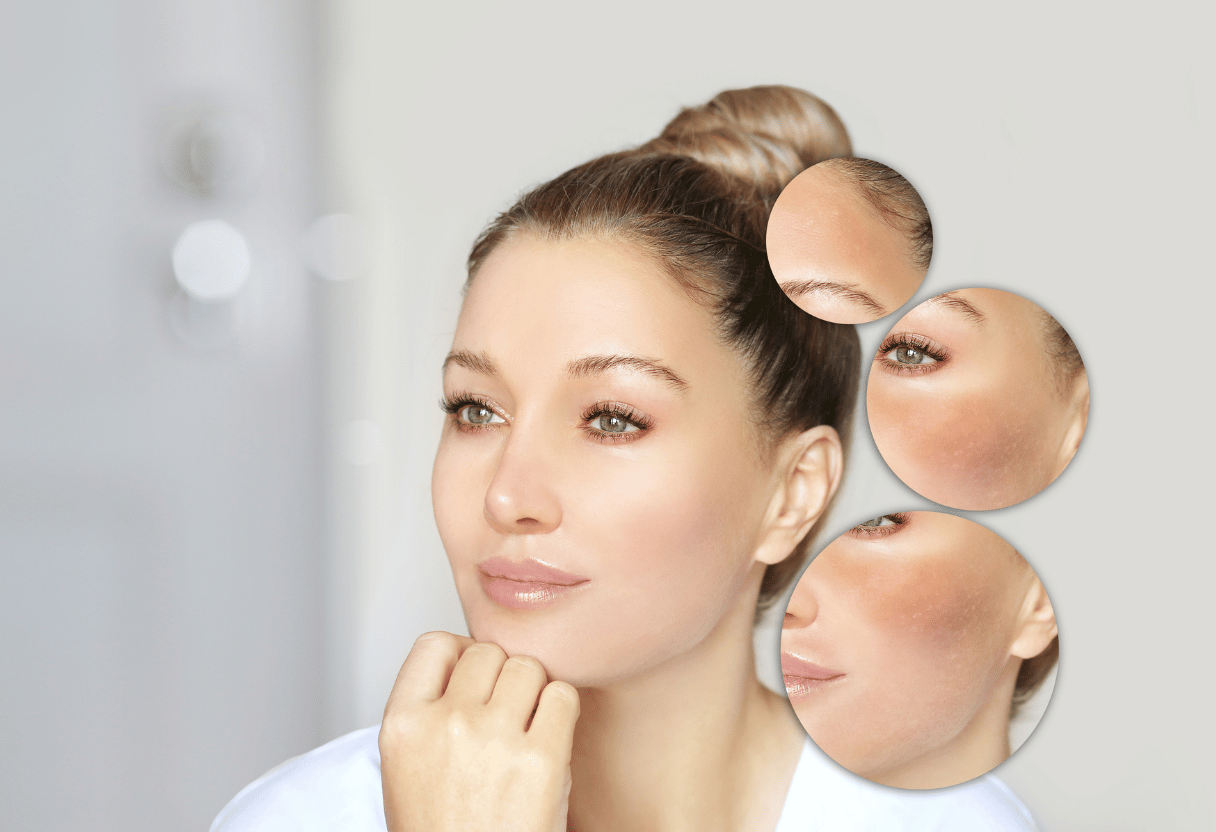
Common Myths About Skin Barrier Care
Unlike popular belief, taking care of your skin’s natural barrier is not solely about using heavy creams or maintaining a rigorous skincare routine. Some people think that all products are suitable for any skin type, which leads to unintended damage. You might be surprised to learn that your specific skin type plays a significant role in determining which products and methods are best for maintaining a healthy barrier. To investigate deeper into how you can successfully rejuvenate your skin, consider checking out Do These 5 Things to Strengthen Your Skin Barrier. Common misconceptions often spread misinformation, leading to unnecessary frustration in your skincare journey.
Misconceptions on Skin Types
For example, many believe that oily skin does not require moisture because it is already producing oil. However, your skin still needs hydration to maintain its natural barrier and reduce excess oil production. On the other hand, dry skin types may assume they need to slather on thick creams to compensate for their skin’s lack of moisture, but this could lead to clogged pores and irritation if the product is too heavy. Here are some common misconceptions about skin types:
| Misconception | Reality |
|---|---|
| Oily skin doesn’t need hydration. | Oily skin can still be dehydrated and needs moisture. |
| All dry skin types require heavy creams. | Lightweight moisturizers can also hydrate effectively. |
| Sensitive skin must avoid all oils. | Some oils can actually soothe & strengthen sensitive skin. |
| You don’t need to change your products seasonally. | Your skin might need different products depending on the season. |
The landscape of skincare is filled with myths that can potentially confuse and mislead you. Understanding your unique skin composition is vital for selecting the right products and establishing a proper routine. For further clarification, read 5 Myths About Skin Types You Should Stop Believing.
Myths About Moisturizers
Any good skincare routine includes an effective moisturizer, but there are many myths surrounding their use that you should be aware of. One common myth is that you only need to moisturize at night. In reality, you should be applying moisturizer both in the morning and at night to give your skin the hydration it craves throughout the day. Additionally, some believe that using a moisturizer will cause breakouts, but a moisturizer formulated for your skin type can actually prevent this by helping to balance your skin’s oil production.
Another widespread myth is that all moisturizers are the same. In fact, there is a stark difference between each product’s formulations. Lightweight, non-comedogenic moisturizers can provide necessary hydration without clogging pores, while heavy creams could lead to an imbalance in oil production. Choosing the right moisturizer, preferably with beneficial ingredients, is vital to support your skin’s natural barrier effectively. For product recommendations, explore 7 Best Moisturizers for All Skin Types.e balance of hydration and protection is vital for maintaining healthy and resilient skin.
To Wrap Up
So, protecting your skin’s natural barrier is necessary for maintaining its health and radiance. By adopting a gentle skincare routine, ensuring proper hydration, and being mindful of the environmental factors that can contribute to skin damage, you can significantly enhance your skin’s resilience. For tips on improving your routine, explore 7 Steps to Build a Barrier-Friendly Skincare Routine.
It’s important to choose products that are free from harsh chemicals and to incorporate nourishing ingredients that support barrier function. Regularly evaluating your skincare habits can help you identify what works best for your unique skin type. For product ideas, check out 5 Best Skincare Products for Healthy Skin Barriers.
Ultimately, fostering a strong skin barrier requires consistency and awareness of your lifestyle choices. By prioritizing adequate sun protection, a balanced diet, and stress management techniques, you empower your skin to thrive. Take the time to listen to your skin and adjust your regimen accordingly; doing so will not only protect your natural barrier but also promote overall skin vitality that you can see and feel every day.
FAQ: How to Protect Your Skin’s Natural Barrier?
Q: What is the skin’s natural barrier and why is it important?
A: The skin’s natural barrier, also known as the stratum corneum, is the outermost layer of the skin. It serves as a protective shield against environmental aggressors like pollutants, bacteria, and harsh weather. This barrier also helps to retain moisture, ensuring that the skin stays hydrated and healthy. A well-functioning barrier is crucial for preventing dryness, irritation, and premature aging.
Q: How can I tell if my skin barrier is damaged?
A: Signs of a damaged skin barrier often include increased sensitivity, redness, irritation, dryness, and flakiness. You might also experience a tight or tight-feeling sensation, as well as breakouts and uneven texture. If you notice these symptoms, it may be time to reassess your skincare routine and address the health of your skin barrier.
Q: What ingredients should I look for in products to support my skin barrier?
A: Look for ingredients that are known to nourish and strengthen the skin barrier. These include ceramides, hyaluronic acid, glycerin, fatty acids, and antioxidants like vitamin E and niacinamide. These components work together to replenish moisture, promote healing, and protect against external irritants.
Q: Are there specific habits I should adopt to maintain my skin barrier?
A: Yes, several habits can promote a healthy skin barrier. These include using a gentle cleanser to avoid stripping the skin of its natural oils, moisturizing daily to keep the skin hydrated, and applying sunscreen to protect against UV damage. Furthermore, it’s beneficial to stay hydrated, maintain a balanced diet rich in vitamins and minerals, and avoid over-exfoliating or using harsh products that can damage the barrier.
Q: Can stress and lifestyle choices impact my skin barrier?
A: Absolutely. Stress can lead to hormonal changes that may trigger skin issues and compromise the skin barrier. Lack of sleep, poor diet, and insufficient hydration can also significantly affect skin health. Incorporating stress management techniques, maintaining a consistent skincare routine, and consuming a balanced diet can help support your skin barrier’s resilience.

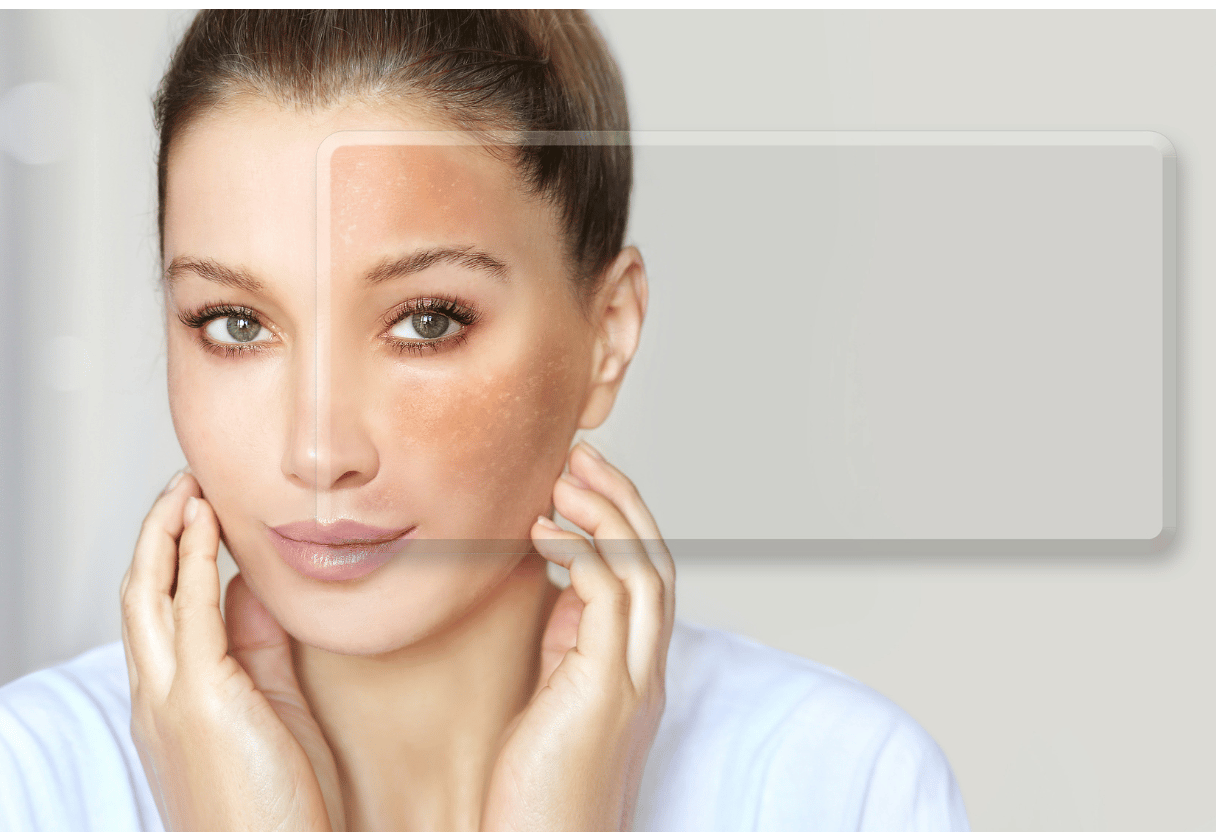





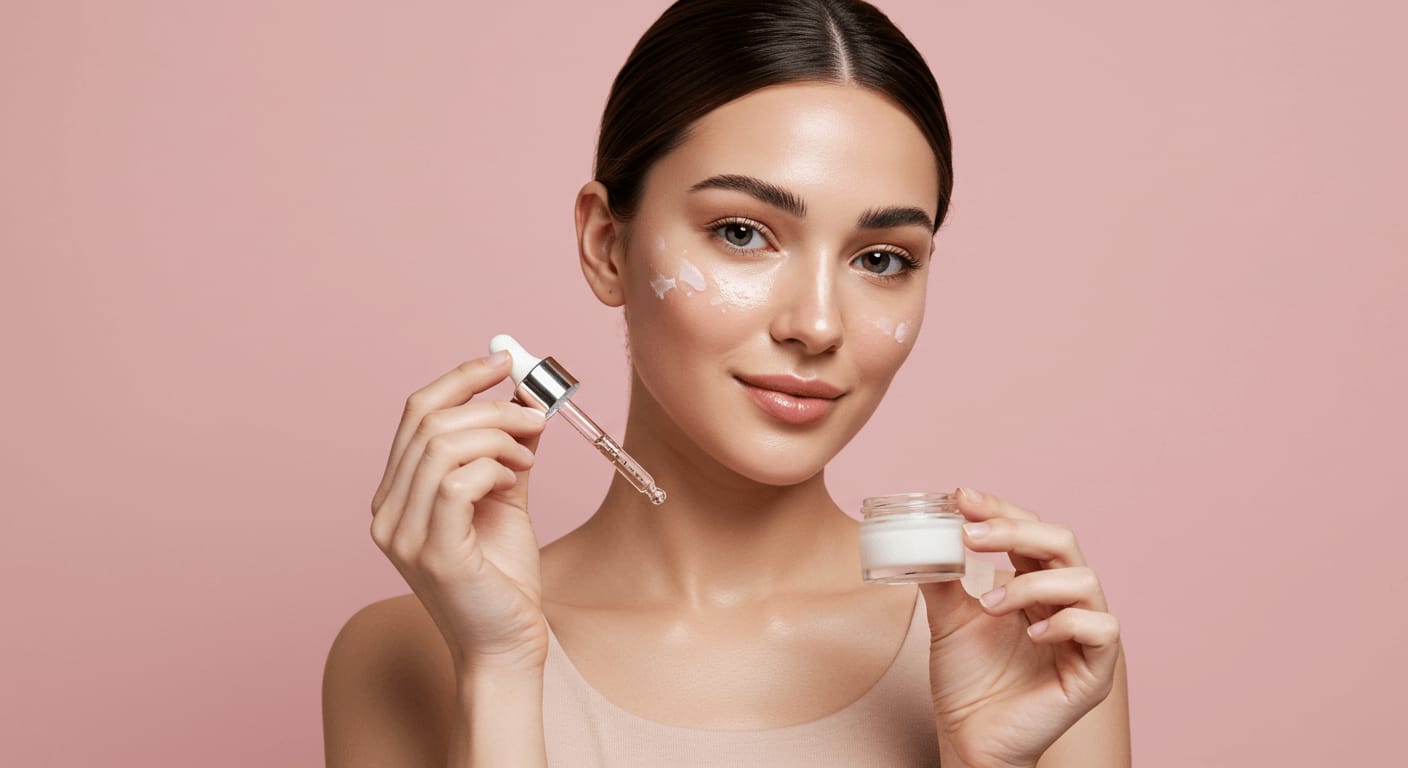







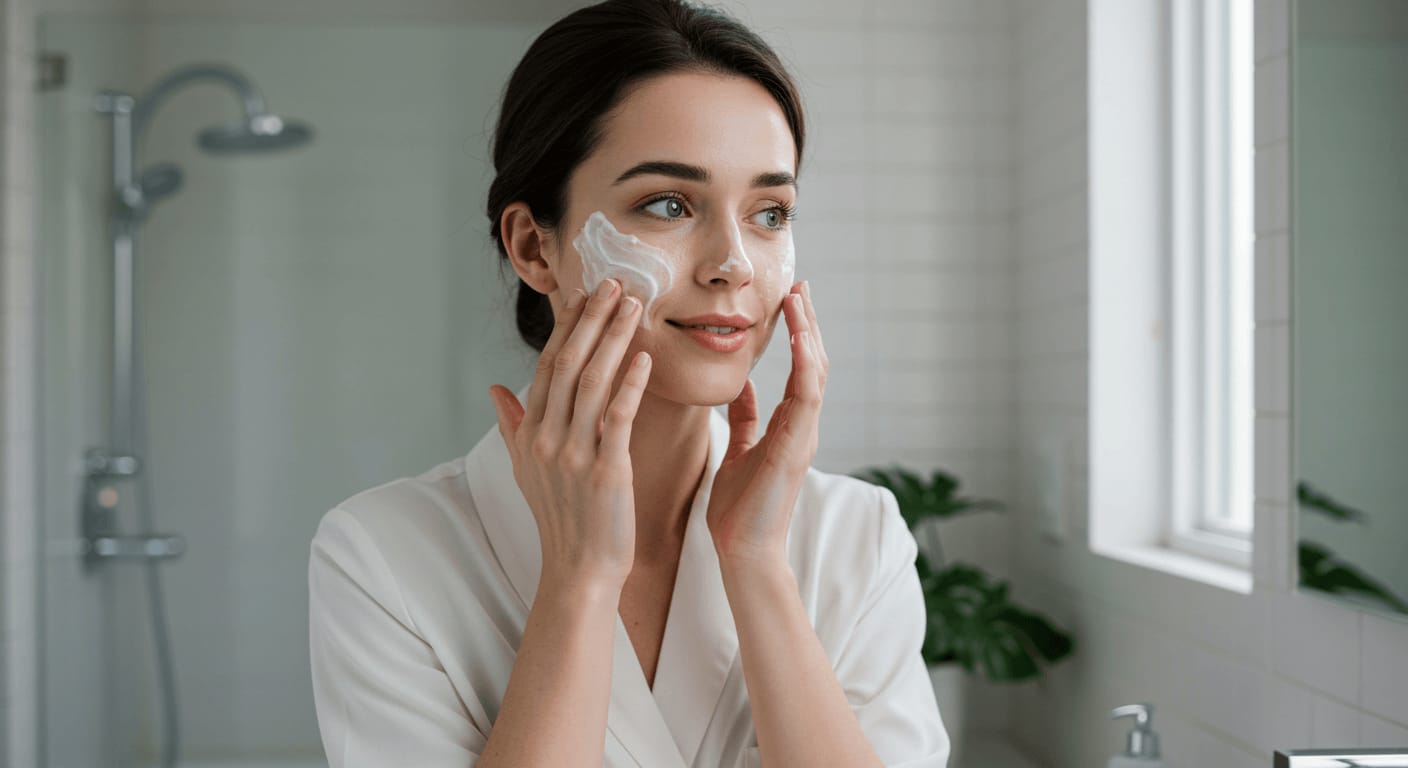








0 Comments